Browse the Collection
Browsing 24 items in our archive
-
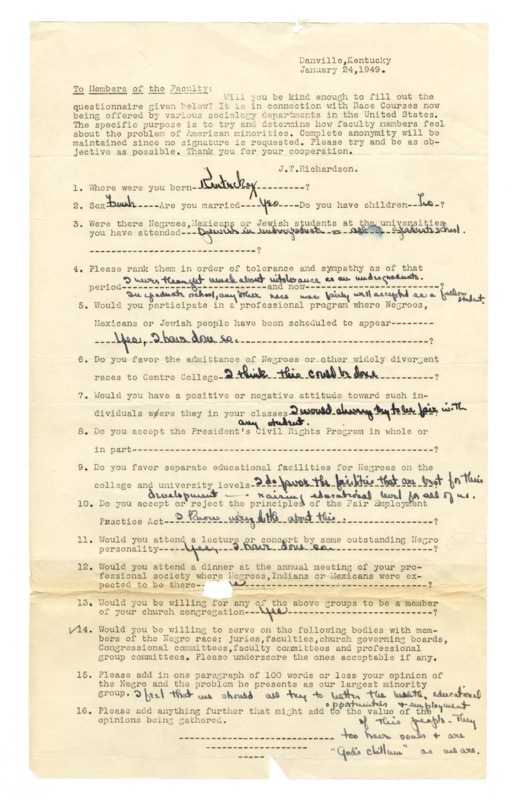 Centre College | Text
Centre College | TextAmerican minorities faculty questionnaire (1)
Anonymous responses to a questionnaire distributed to Centre College faculty January 24, 1949, the stated purpose of which was "to try an determine how faculty members feel about the problem of American minorities."Learn more -
 Centre College | Text
Centre College | TextAmerican minorities faculty questionnaire (10)
Anonymous responses to a questionnaire distributed to Centre College faculty January 24, 1949, the stated purpose of which was "to try an determine how faculty members feel about the problem of American minorities."Learn more -
 Centre College | Text
Centre College | TextAmerican minorities faculty questionnaire (11)
Anonymous responses to a questionnaire distributed to Centre College faculty January 24, 1949, the stated purpose of which was "to try an determine how faculty members feel about the problem of American minorities."Learn more -
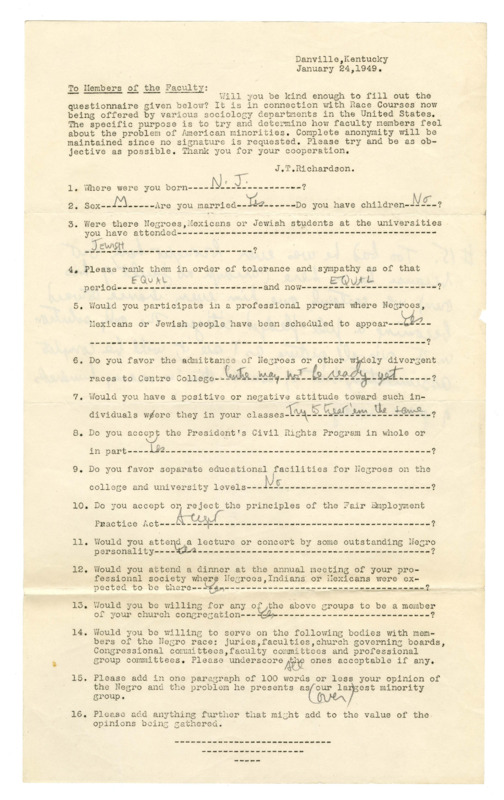 Centre College | Text
Centre College | TextAmerican minorities faculty questionnaire (12)
Anonymous responses to a questionnaire distributed to Centre College faculty January 24, 1949, the stated purpose of which was "to try an determine how faculty members feel about the problem of American minorities."Learn more -
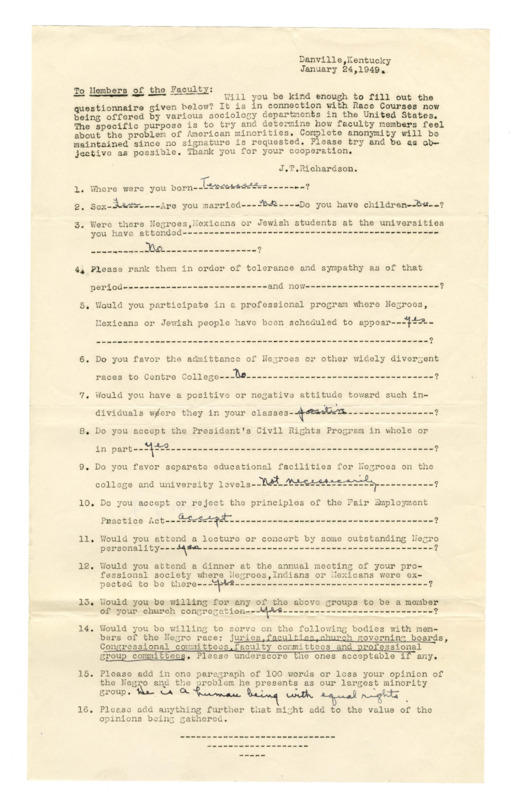 Centre College | Text
Centre College | TextAmerican minorities faculty questionnaire (2)
Anonymous responses to a questionnaire distributed to Centre College faculty January 24, 1949, the stated purpose of which was "to try an determine how faculty members feel about the problem of American minorities."Learn more -
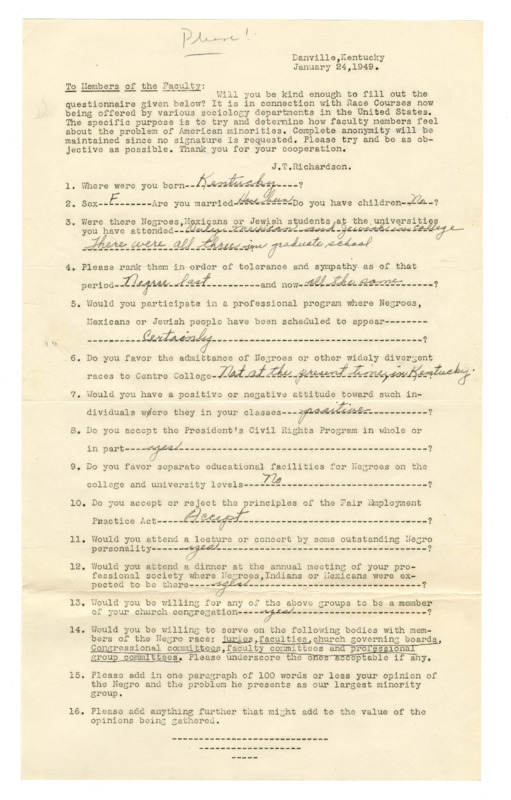 Centre College | Text
Centre College | TextAmerican minorities faculty questionnaire (3)
Anonymous responses to a questionnaire distributed to Centre College faculty January 24, 1949, the stated purpose of which was "to try an determine how faculty members feel about the problem of American minorities."Learn more -
 Centre College | Text
Centre College | TextAmerican minorities faculty questionnaire (4)
Anonymous responses to a questionnaire distributed to Centre College faculty January 24, 1949, the stated purpose of which was "to try an determine how faculty members feel about the problem of American minorities."Learn more -
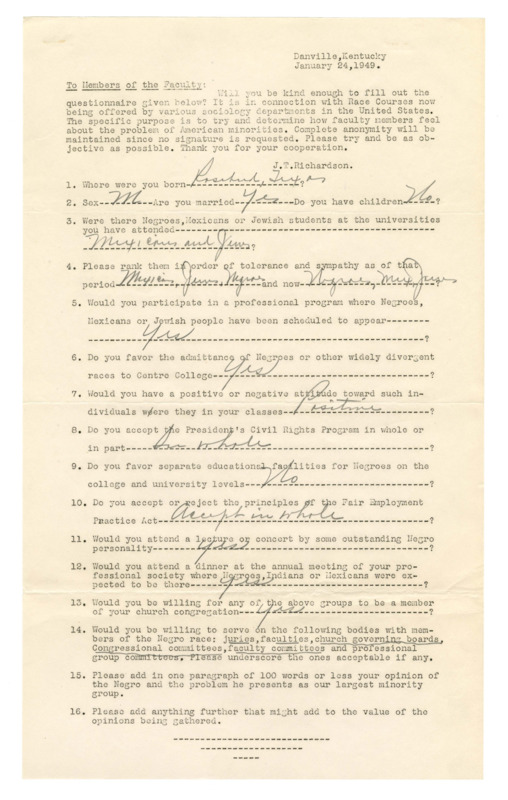 Centre College | Text
Centre College | TextAmerican minorities faculty questionnaire (5)
Anonymous responses to a questionnaire distributed to Centre College faculty January 24, 1949, the stated purpose of which was "to try an determine how faculty members feel about the problem of American minorities."Learn more -
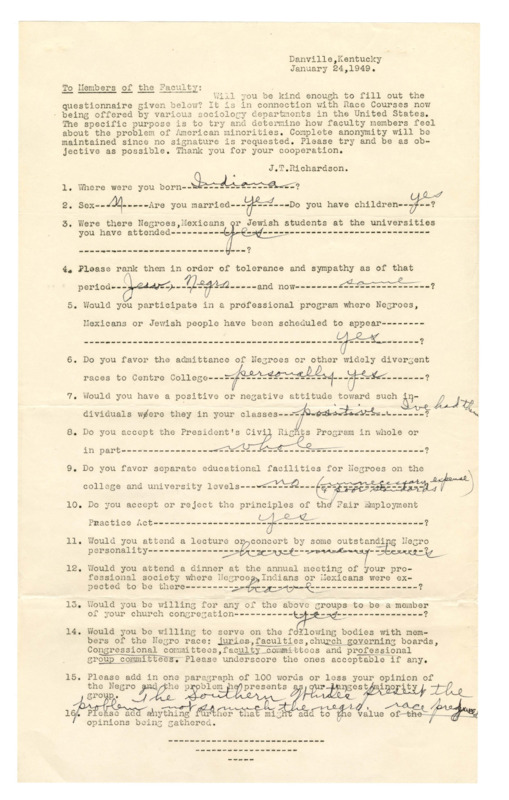 Centre College | Text
Centre College | TextAmerican minorities faculty questionnaire (6)
Anonymous responses to a questionnaire distributed to Centre College faculty January 24, 1949, the stated purpose of which was "to try an determine how faculty members feel about the problem of American minorities."Learn more -
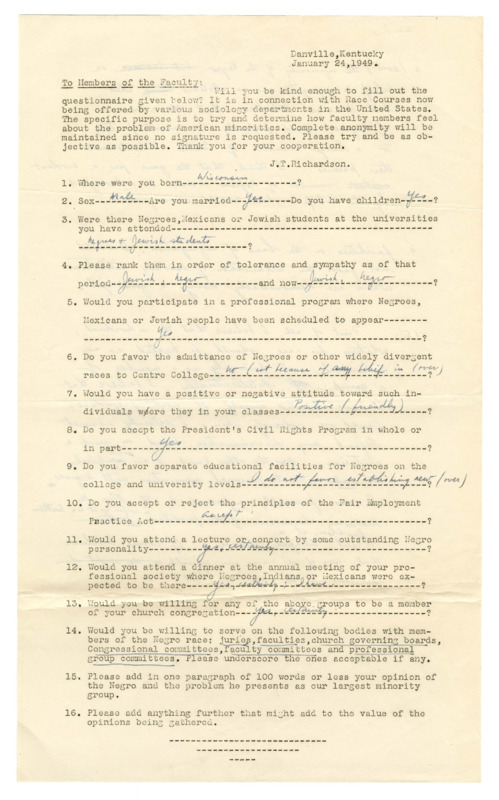 Centre College | Text
Centre College | TextAmerican minorities faculty questionnaire (7)
Anonymous responses to a questionnaire distributed to Centre College faculty January 24, 1949, the stated purpose of which was "to try an determine how faculty members feel about the problem of American minorities."Learn more -
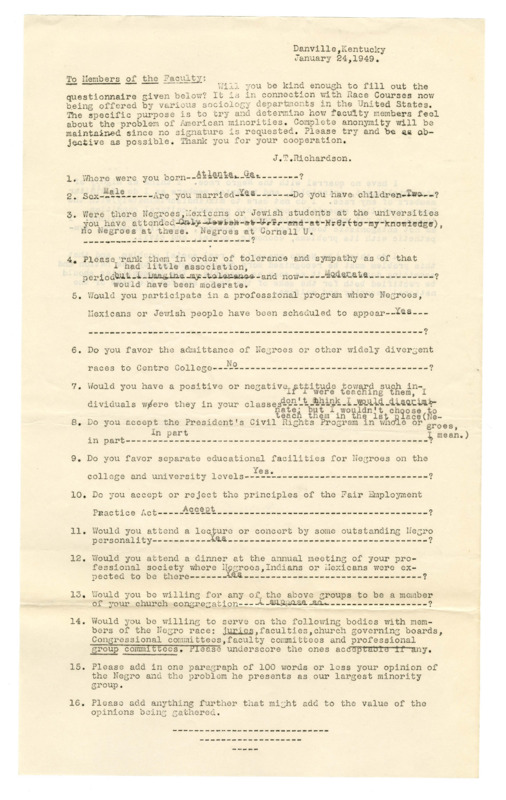 Centre College | Text
Centre College | TextAmerican minorities faculty questionnaire (8)
Anonymous responses to a questionnaire distributed to Centre College faculty January 24, 1949, the stated purpose of which was "to try an determine how faculty members feel about the problem of American minorities."Learn more -
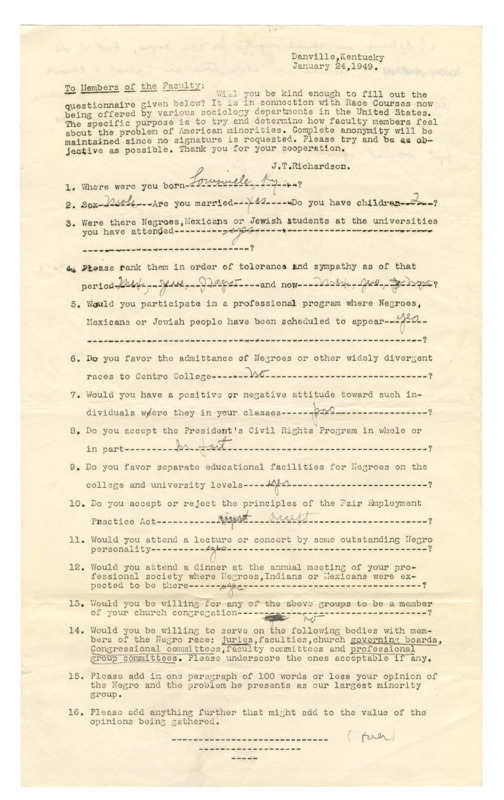 Centre College | Text
Centre College | TextAmerican minorities faculty questionnaire (9)
Anonymous responses to a questionnaire distributed to Centre College faculty January 24, 1949, the stated purpose of which was "to try an determine how faculty members feel about the problem of American minorities."Learn more -
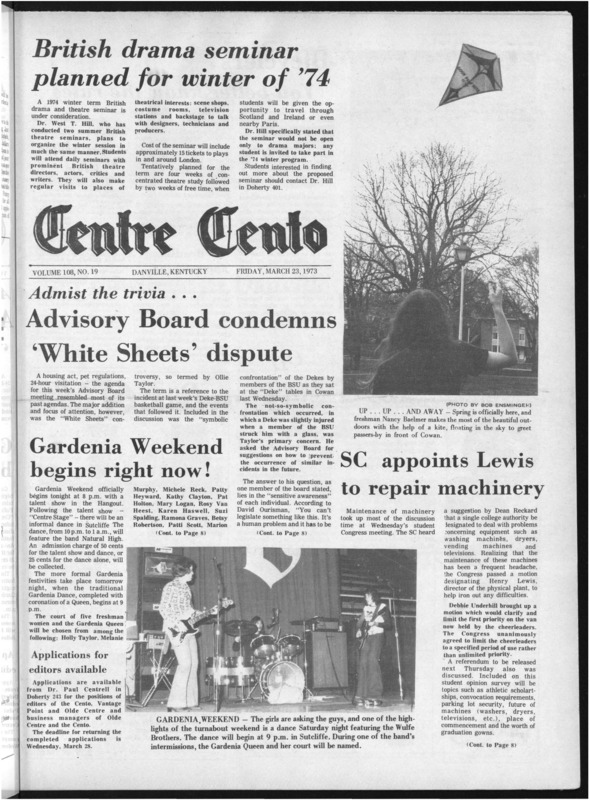 Centre College | Text
Centre College | TextAmidst the Trivia...Advisory Board Condems ‘White Sheets’ Dispute
Reporting on the Advisory Board meeting, during which was discussed, among other things (including the Yerkes lounge to be used by the BSU), the incident involving the Dekes wearing white sheets at the BSU basketball game, and ensuing confrontation between Dekes and members of the BSU at Cowan which resulted in a member of the Deke fraternity being injured after being struck by a glass by a member of the BSU.Learn more -
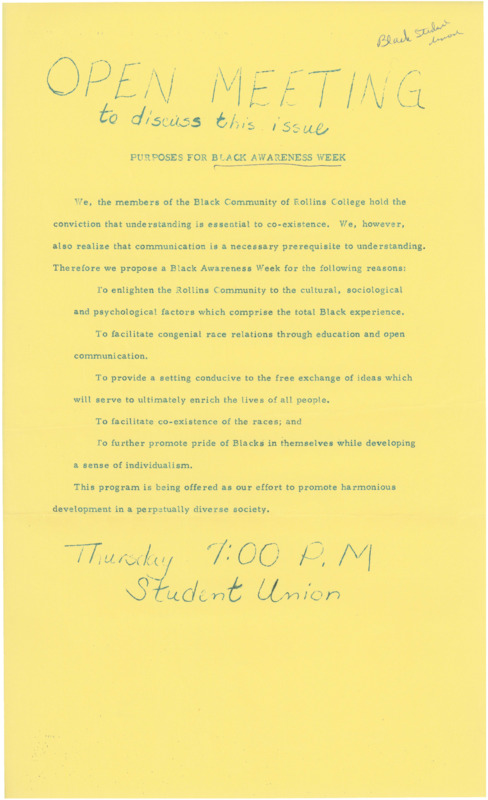 Rollins College | Text
Rollins College | TextBSU Open Meeting Flyer, 1972
The flyer invites the Rollins community to attend an open discussion meeting in 1972 with the Black Student Union. This meeting was to address concerns about the purpose of the first scheduled Black Awareness Week, since there had been a mixed response to news of plans for this event.Learn more -
 Furman University | Text
Furman University | TextFight Goes On, But Candidly, Is Finished
Column, entitled 'Candidly,' written by student, Chuck Graham '62, appearing in Furman's student newspaper, The Paladin, dated May 19, 1962. Graham is ending his column as he is graduating soon, but writes that the struggle for power over Furman, which 'straddles the two worlds of a narrow, denominational school and a leading educational institution,' will continue to be fought.Learn more -
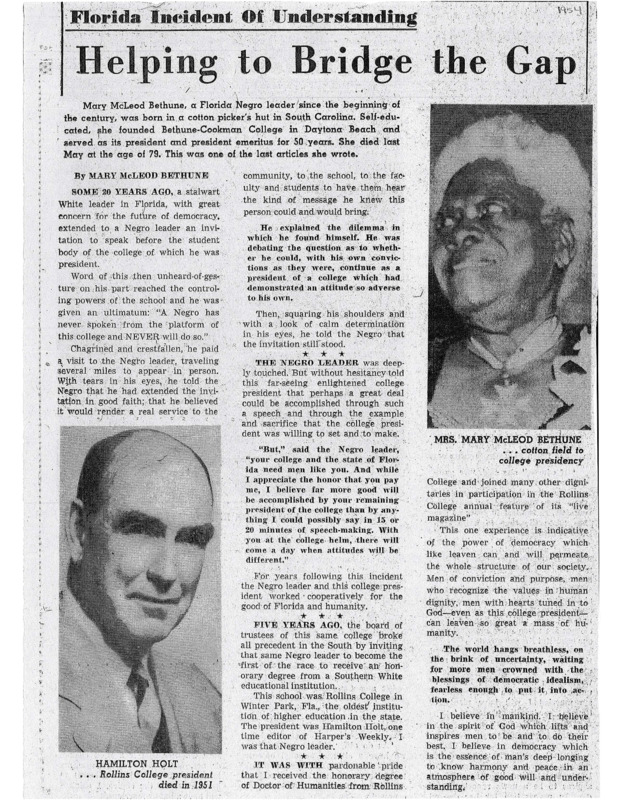 Rollins College | Text
Rollins College | TextHelping to Bridge the Gap
This article, written by Mary McLeod Bethune, discusses her friendship with President Hamilton Holt. It outlines the path of acceptance of African Americans at Rollins College, and her hope for further acceptance and integration in the future. Circa 1955-1956Learn more -
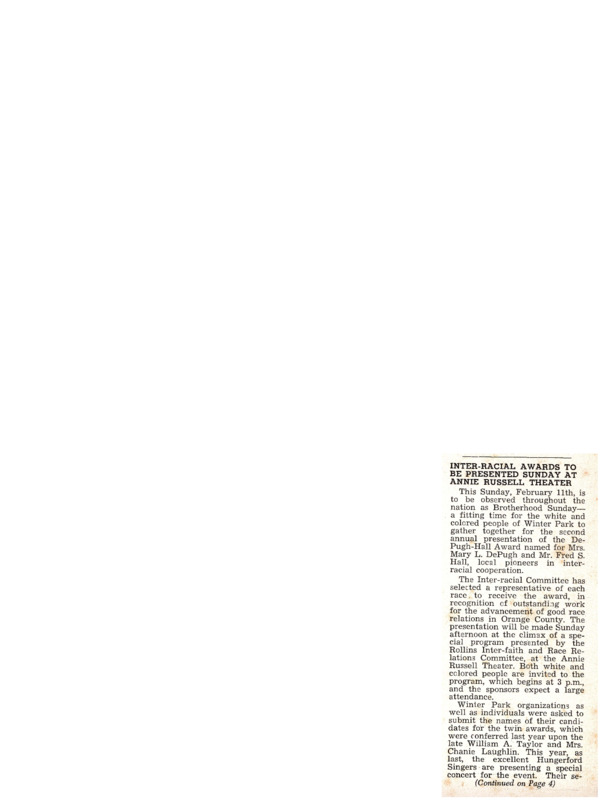 Rollins College | Text
Rollins College | TextInterracial Awards to be Presented Sunday at Annie Russell Theatre, 1951
Winter Park Topics covers the upcoming Brotherhood Sunday and the presentation of the DePugh-Hall Awards for the advancement of race relations--one award for a white resident and one for an African American resident. The article specifically invites both white and African American community members to the Rollins campus for the program.Learn more -
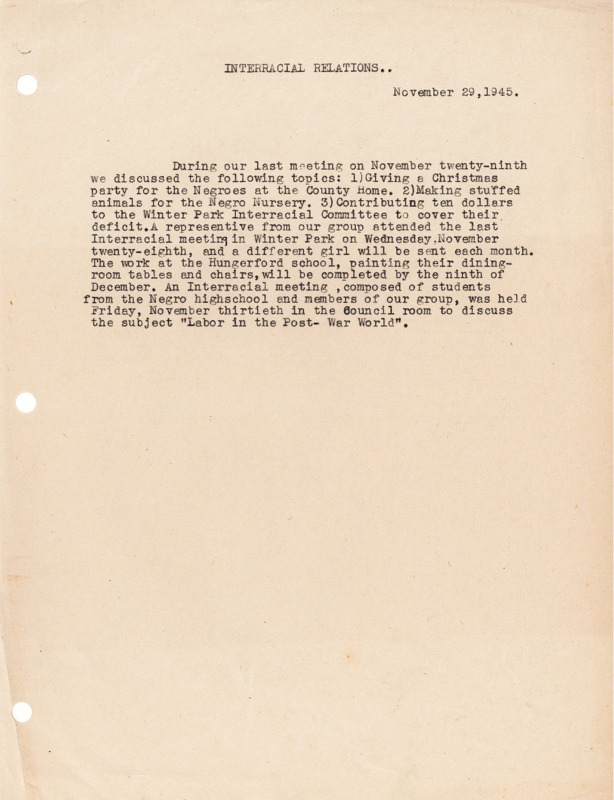 Rollins College | Text
Rollins College | TextInterracial Committee Meeting Notes, 1945
An overview of completed and planned tasks for the Race Relations Committee in November 1945. The activities show the interaction between the group and local African American community to volunteer, donate, and share ideas.Learn more -
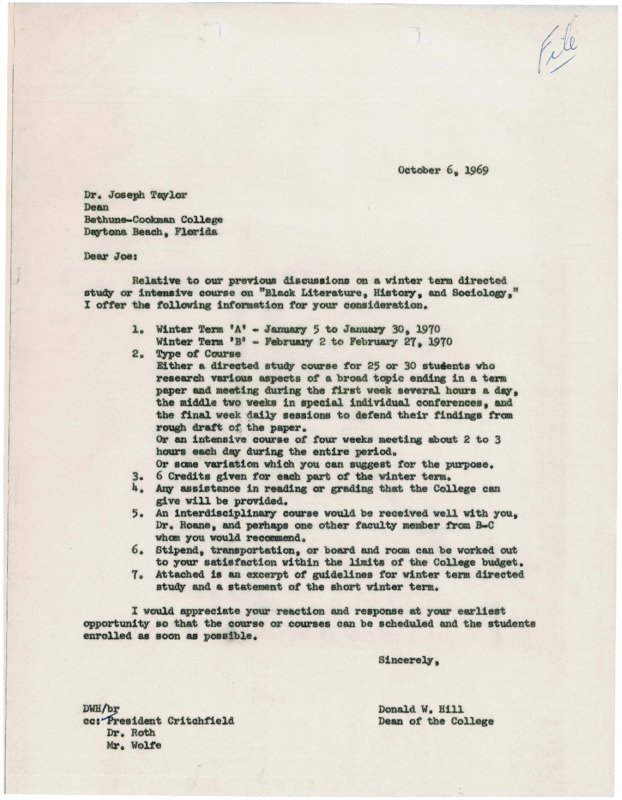 Rollins College | Text
Rollins College | TextLetter from Donald W. Hill to Joseph Taylor, 1969
The administration responds to student demands for more Black studies by creating a winter term course on "Black Literature, History and Sociology." The Dean of Rollins College consulted the Dean of Bethune-Cookman College on the structure and content of the course, demonstrating continued cooperation between the two institutions.Learn more -
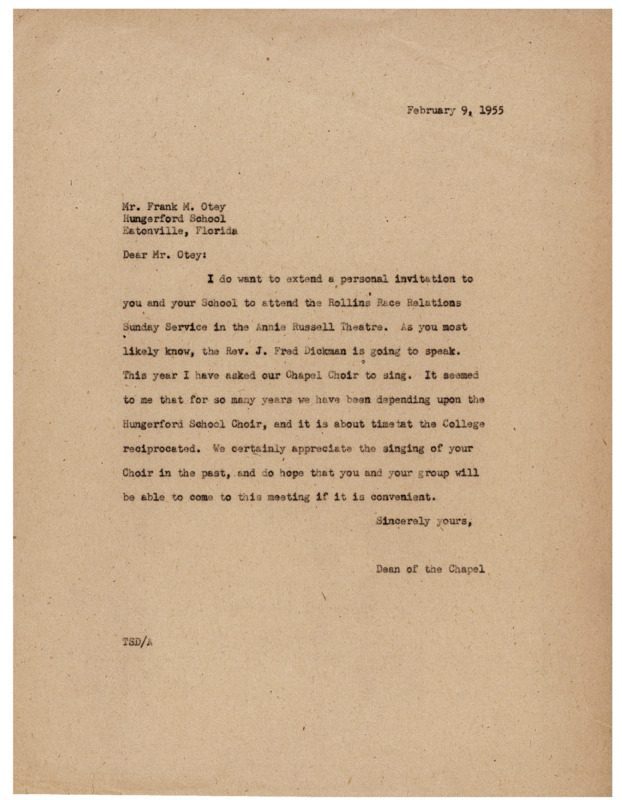 Rollins College | Text
Rollins College | TextLetter From Theodore Darrah to Frank Otey, 1955
Theodore Darrah, the Dean of Knowles Memorial Chapel, invites Frank Otey, Principal of the Hungerford School, and his students to the Race Relations Sunday service. Dean Darrah notes that Rollins College will be providing the choir for the service, which is a change from their usual reliance on the Hungerford choir. The change demonstrates a more equal exchange between the Hungerford School and Rollins College.Learn more -
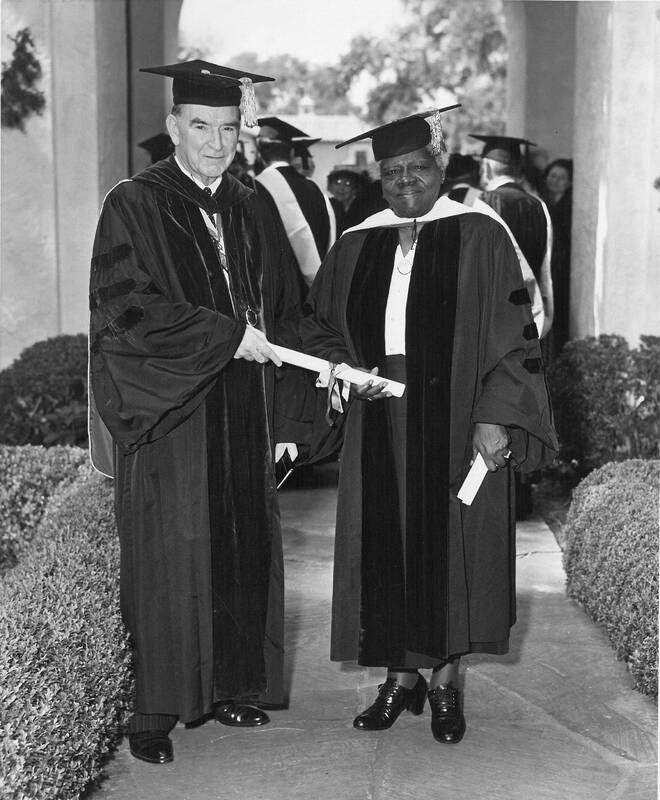 Rollins College | Image
Rollins College | ImageMary McLeod Bethune Receives an Honorary Degree from Rollins, 1949
Hamilton Holt awarding Mary McLeod Bethune, President Emerita of Bethune-Cookman College, with an honorary degree of Doctor of Humanities.This is the first honorary degree given to an African American by an institution of higher education in the South.Learn more -
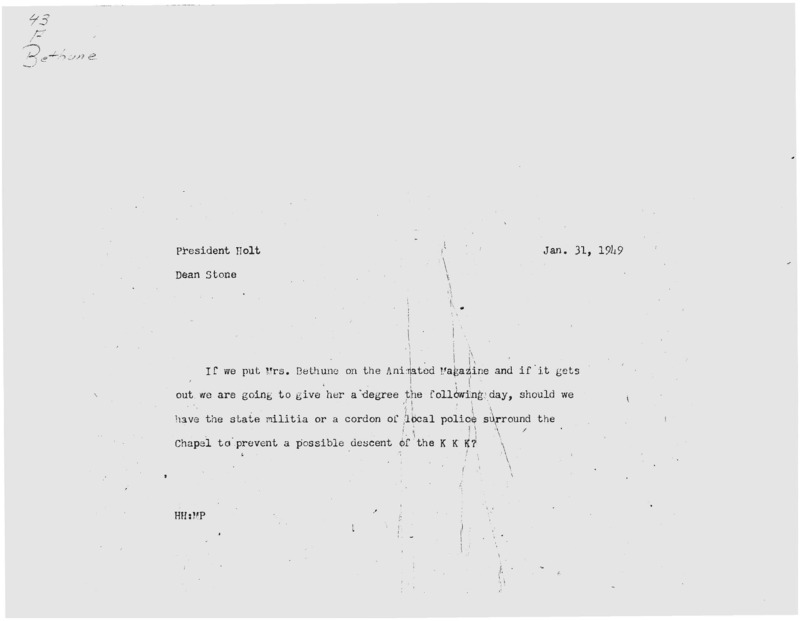 Rollins College | Text
Rollins College | TextMemorandum from Hamilton Holt to Dean Wendell Stone, 1949
Hamilton Holt expresses concern that the announcement of Mary McLeod Bethune's honorary degree would cause protesting and interference from the KKK. His fears proved to be unfounded, but facing violence was a real possibility.Learn more -
 Rollins College | Text
Rollins College | TextMission Statement of the Inter-Faith and Race Relations Committee
A mission statement provided by the Rollins College Interfaith and Race Relations Committee regarding improving relations between various racial and religious groups. The statement uses idealistic and vague language along with war imagery to convey their dedication to the ideals of peace and prosperity of all groups.Learn more -
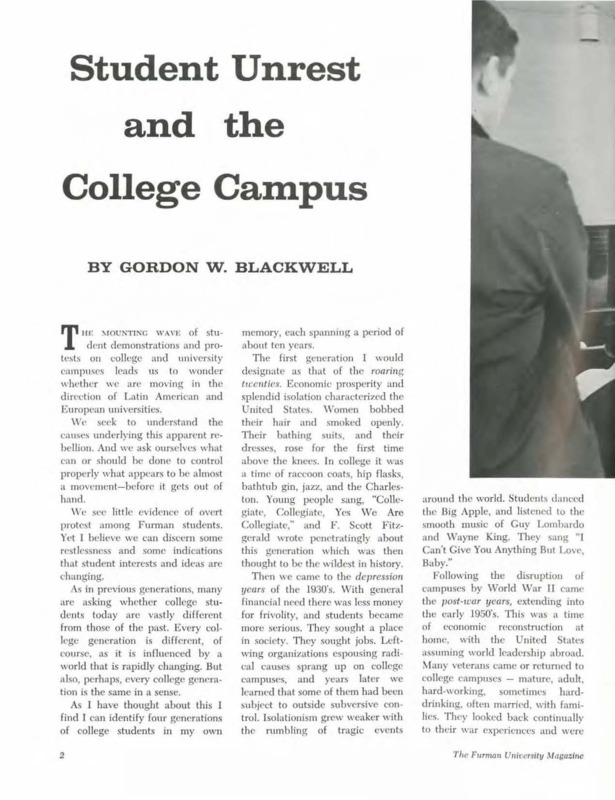 Furman University | Text
Furman University | TextStudent Unrest and the College Campus
An article written by Furman president, Gordon Blackwell, published in Furman Magazine, v. 14 (no. 3), Winter 1966. President Blackwell writes about the history of social change on college campuses thoughout the generations, as well as the current state of student unrest and social revolution at Furman in the 1960's.Learn more
